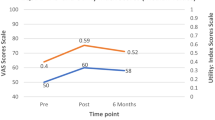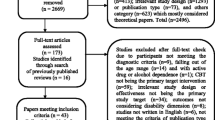Abstract
Background
Functional Neurological Disorder (FND) is a complex neuropsychiatric condition with a multifactorial aetiology. The heterogeneity of patients with FND is rarely considered in psychotherapy trials, which may contribute to variable outcomes. Shared Individual Formulation Therapy (SIFT) is a new, brief (four session) psychotherapy that aims to accommodate heterogeneity by providing a personalised, trans-theoretical formulation of the person’s difficulties and accompanying management plan.
Methods
An open-label, prospective trial of outpatient SIFT for adults with FND was conducted, using health-related quality of life (SF-12) as the principal outcome measure, with secondary measures of mental health, dissociation, health care use and attitude to the FND diagnosis. Measures were collected at baseline, end of treatment and 6- and 12-month follow-ups.
Results
Twenty-nine participants with various FND symptoms enrolled. Twenty-four completed all four sessions and 25 completed follow-up measures at 12 months. SF-12 scores improved significantly at end of treatment and were sustained throughout follow-up with moderate effect sizes (0.39–0.47; all p < 0.001). Most secondary outcomes also improved significantly at all time points. The intervention was highly acceptable and tolerable to patients and perceived as beneficial.
Conclusion
This trial provides preliminary evidence for initial and sustained benefit from SIFT for adults with FND. Further study is needed to validate these findings.




Similar content being viewed by others
Change history
05 October 2021
A Correction to this paper has been published: https://doi.org/10.1007/s00415-021-10816-y
References
Carson A, Stone J, Hibberd C, Murray G, Duncan R, Coleman R et al (2011) Disability, distress and unemployment in neurology outpatients with symptoms “unexplained by organic disease.” J Neurol Neurosurg Psychiatry 82:810–813
Edwards MJ, Adams RA, Brown H, Parees I, Friston KJ (2012) A Bayesian account of “hysteria.” Brain 135:3495–3512
Pick S, Goldstein LH, Perez DL, Nicholson TR (2019) Emotional processing in functional neurological disorder: a review, biopsychosocial model and research agenda. J Neurol Neurosurg Psychiatry 90:704–711
Gutkin M, McLean L, Brown R, Kanaan RA (2021) Systematic review of psychotherapy for adults with functional neurological disorder. J Neurol Neurosurg Psychiatry 92:36–44
Goldstein LH, Robinson EJ, Mellers JDC, Stone J, Carson A, Reuber M et al (2020) Cognitive behavioural therapy for adults with dissociative seizures (CODES): a pragmatic, multicentre, randomised controlled trial. The Lancet Psychiatry 7:491–500
Blagys MD, Hilsenroth MJ (2000) Distinctive features of short-term psychodynamic-interpersonal psychotherapy: a review of the comparative psychotherapy process literature. Clin Psychol Sci Pract 7:167–188
George C, Kaplan N, Main M (1996) Adult attachment interview. Unpublished manuscript (3rd edn) University of California, Berkeley
McLean LM, Rogers V, Kornhaber R, Proctor M-T, Kwiet J, Streimer J et al (2015) The patient–body relationship and the “lived experience” of a facial burn injury: a phenomenological inquiry of early psychosocial adjustment. J Multidiscip Healthc 8:377
Nicholson TR, Carson A, Edwards MJ, Goldstein LH, Hallett M, Mildon B et al (2019) Outcome measures for functional neurological disorder: a review of the theoretical complexities. J Neuropsychiatry Clin Neurosci. https://doi.org/10.1176/appi.neuropsych.19060128
Jacobson NS, Truax P (1991) Clinical significance: a statistical approach to defining meaningful change in psychotherapy research. J Consult Clin Psychol 59(1):12–19
Salyers MP, Bosworth HB, Swanson JW, Lamb-Pagone J, Osher FC (2000) Reliability and validity of the SF-12 health survey among people with severe mental illness. Med Care 38(11):1141–1150
Hope J, Trauer T, Keks NA (1998) Reliability, validity and utility of the health of the nation outcome scale (HoNOS) in Australian adult psychiatric services. Schizophr Res 1:9–10
Schalinski I, Schauer M, Elbert T (2015) The shutdown dissociation scale (Shut-D). Eur J Psychotraumatol 6:25652
Demartini B, Batla A, Petrochilos P, Fisher L, Edwards MJ, Joyce E (2014) Multidisciplinary treatment for functional neurological symptoms: a prospective study. J Neurol 261:2370–2377
Slade A, Holmes J (2019) Attachment and psychotherapy. Curr Opin Psychol 25:152–156
Espay AJ, Aybek S, Carson A, Edwards MJ, Goldstein LH, Hallett M et al (2018) Current concepts in diagnosis and treatment of functional neurological disorders. JAMA Neurol 75:1132–1141
Shedler J (2010) The efficacy of psychodynamic psychotherapy. Am Psychol 65:98
Acknowledgements
The authors would like to thank Dr Ralf Ilchef of the Consultation Liaison Psychiatry Department, and Dr Mark Thieben of the Neurology Department at Royal North Shore Hospital for their support of this research.
Funding
The RANZCP Foundation has provided financial support for this research through the Beverley Raphael New Investigator Grant (2017)/Psychotherapy Research Award (2019).
Author information
Authors and Affiliations
Contributions
MG conceived of and carried out the intervention, analysed data and wrote the manuscript. RB and RK contributed to research design, data interpretation and contributed to the manuscript. LM contributed to intervention, research design, clinical supervision and final drafts of the manuscript. JS contributed to intervention design, clinical supervision and final drafts of the manuscript.
Corresponding author
Ethics declarations
Conflicts of interest
The authors declare no conflict of interest.
Supplementary Information
Below is the link to the electronic supplementary material.
Rights and permissions
About this article
Cite this article
Gutkin, M., Brown, R.J., McLean, L. et al. Shared Individual Formulation Therapy (SIFT): an open-label trial of a new therapy accommodating patient heterogeneity in functional neurological disorder. J Neurol 268, 4882–4889 (2021). https://doi.org/10.1007/s00415-021-10797-y
Received:
Revised:
Accepted:
Published:
Issue Date:
DOI: https://doi.org/10.1007/s00415-021-10797-y




